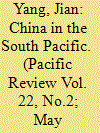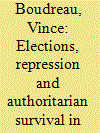|
|
|
Sort Order |
|
|
|
Items / Page
|
|
|
|
|
|
|
| Srl | Item |
| 1 |
ID:
088448


|
|
|
|
|
| Publication |
2009.
|
| Summary/Abstract |
China's influence in the South Pacific appears to be growing rapidly. Some analysts are concerned that China is on its way to replacing the West as the dominant power and China's rise in the region poses a major threat to the West. However, there is no clear evidence to suggest that China's deepening involvement in the South Pacific is a calculated strategic move for its military security. The move can be strategic mainly in the sense that it has strong implications for China's reunification strategy and it serves China's long-term development strategy. The strategic value of the South Pacific to China's national security is limited at present and will remain so in the foreseeable future. China also lacks the military capability to challenge the US-led West in the region in the years to come. Chinese influence in the region is not deep-rooted and is largely based on its 'no-strings-attached' aid and its increasing economic interactions with the region. China has serious image problems in the region and these problems are unlikely to be resolved in the near future. China thus has neither the hard power nor the soft power to become a genuine hegemon in the region.
|
|
|
|
|
|
|
|
|
|
|
|
|
|
|
|
| 2 |
ID:
088449


|
|
|
|
|
| Publication |
2009.
|
| Summary/Abstract |
This paper explores how the Association of Southeast Asian Nations (ASEAN) has tackled the threat of terrorism since 9/11 and the Bali bombings. It claims that ASEAN has applied its traditional approach to security, based on comprehensive security and the principle of resilience, when addressing this challenge. The resilience concept underpins the nexus between national and regional security and emphasizes domestic regime consolidation re-enforced by regional consultations. In their pursuit of resilience, member states have sought in various degrees to address terrorism domestically through a mixture of security, law enforcement, socio-economic, ideological, and educational policies. It is noted that Indonesia, the Philippines, and Singapore have tackled terrorism more comprehensively than Thailand and Malaysia. Reflecting the synergy between national and regional resilience, ASEAN has operated as an umbrella organization meant to complement domestic and sub-regional efforts. It has been committed rhetorically, has produced frameworks of action, as well as reached agreements with the great powers. The paper is not overly optimistic, however, about ASEAN's role in promoting regional resilience against the threat of terrorism in Southeast Asia.
|
|
|
|
|
|
|
|
|
|
|
|
|
|
|
|
| 3 |
ID:
088450


|
|
|
|
|
| Publication |
2009.
|
| Summary/Abstract |
Why have ASEAN member states declared and why do they continue to declare their intention to enhance cooperation and devise projects when implementation lags behind their rhetoric? Why do they rhetorically commit themselves to cooperation, when they continue to stick to self-interested policies to the detriment of ASEAN's collective interest? And given these diverging practices, how likely is it that the objective of a more legalized and binding cooperation associated with the recently ratified ASEAN Charter is being implemented? This article draws attention to ASEAN's hybrid or dual character of international cooperation, consisting of the emulation of the European integration project and the persistence of deeper cultural strata of Southeast Asia's cooperation project that determine the limits of cooperation: Southeast Asia's social structure and political culture that have not produced those mechanisms that might facilitate international cooperation. If our explanation is correct that cooperation within ASEAN comes about as a simultaneous process of emulation and established cultural practices, we expect change only under specified conditions. Based on our argument and the theoretical literature on normative change, we identify and discuss in greater detail three potential outcomes of change: inertia, localization and transformation. The three modes make different predictions concerning change within ASEAN. Based on an analysis of the two major shocks with which ASEAN has had to contend in the last two decades, namely the Cold War in Asia and the Asian financial crisis, we argue that ASEAN's dominant response to major ideational challenges has been combinations of localization and inertia and has not been followed by a fundamental change of practice
|
|
|
|
|
|
|
|
|
|
|
|
|
|
|
|
| 4 |
ID:
088452


|
|
|
|
|
| Publication |
2009.
|
| Summary/Abstract |
This paper compares post-transition Philippines and Indonesia, examining the ways in which authoritarian practices survive and are shaped by regime transition. It examines the transition process in each case, to identify the problems of management and control that regime elites set for themselves in the post-dictatorship period. It is argued that Philippine elites set out to disaggregate and domesticate an already mobilized opposition movement, while the Indonesian authorities strove to keep similar popular politics from mobilizing. The paper then considers how these political objectives find expression in the structuring of two important institutional fields - the electoral and policy making processes - concluding with an examination of how these considerations influence patterns of repression. In particular, the paper also investigates whether repression targets primarily proscribed modes of activity, or sets out to threaten and intimidate proscribed organizations and people. Differences in electoral and policy processes, as well as in patterns of repression, demonstrate the ways in which authoritarianism can survive regime transitions and can undermine the promise of democracy in the post-dictatorship period.
|
|
|
|
|
|
|
|
|
|
|
|
|
|
|
|
| 5 |
ID:
088447


|
|
|
|
|
| Publication |
2009.
|
| Summary/Abstract |
Northeast Asia is notable for the relative absence of regional institutions. The Six Party Talks could constitute an embryonic starting point for the development of such institutions. The path toward greater institutionalization is likely to begin in a modest fashion. Functional working groups on topics such as the environment, maritime transport, technical barriers to trade, road and rail links, and energy could provide the locus for integrating North Korea into the broader regional and global economies. Foreign ministries will inevitably take the lead in developing the Northeast Asia Peace and Security Mechanism (NEAPSM), but meaningful economic achievements will require the involvement of other ministries. North Korea has proved problematic in this regard thus far. Moreover, given the importance of private-sector involvement in achieving sustainable economic development in North Korea, modalities will have to be developed to integrate private-sector actors when possible. The governments of the region, and particularly China and South Korea, may continue support on a bilateral basis as a hedge against North Korea's collapse or as inducements in the context of the nuclear talks. But the development of more permanent multilateral structures is unlikely until the nuclear issue is resolved.
|
|
|
|
|
|
|
|
|
|
|
|
|
|
|
|
| 6 |
ID:
088451


|
|
|
|
|
| Publication |
2009.
|
| Summary/Abstract |
Can economic interdependence reduce conflicts among states in East Asia? The so-called 'cold politics and hot economics' has become a defining feature of Sino-Japanese political-economic relations. This puzzling pattern of interaction is clearly illustrated in the sovereignty dispute over the Senkaku/Diaoyu Islands. The island dispute has unfolded in five rounds of distinct clashes thus far. From one perspective, the competitive elements in the island dispute make it difficult for both Japan and China to give way to the other side on the territorial and maritime issues. At the same time, the two countries have successfully managed to contain their respective territorial and maritime claims thus far. Drawing on the liberal peace theory, this article systematically demonstrates that economic interdependence has repeatedly fostered the de-escalation of Sino-Japanese conflict over territorial and maritime rights
|
|
|
|
|
|
|
|
|
|
|
|
|
|
|
|
|
|
|
|
|